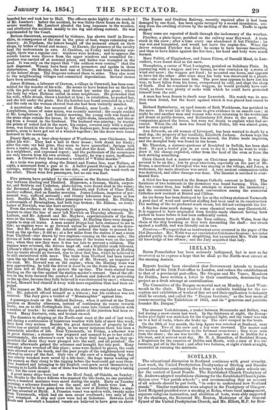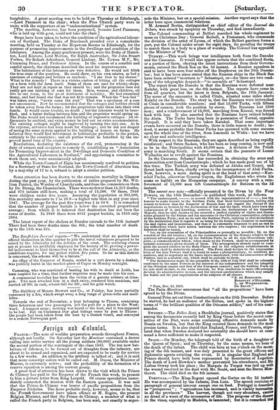SCOTLAND.
The educational discussion in Scotland continues with great vivacity. Last week, the United Presbyterian Presbyteries of Stirling and Dundee passed resolutions condemning the scheme which would place schools un- der the control of Local Boards. The Established Church Presbytery of St. Andrews adopted resolutions claiming for the Established Church juris- diction over "her parish schools" ; and recommending that an account of all schools should be put forth, "in order to understand how Scotland stands." Similar resolutions were adopted in the Presbytery of Glasgow. Lord Melgund presided over a meeting at Kelso, where local management, separate religious instruction, and abolition of tests, were ably supported by the chairman, the Reverend Mr. Renton, Moderator of the General Synod of the United Presbyterian Church, and Mr. Elliott, M.P. for Rox- baigHslorra. A great meeting.was to be held on Thursday at Edinburgh,. Panmure in the ehair ; when the Free Church party were to unite with the supporters of an " undenominational" system.
[The meeting, however, has been postponed, because Lord Panmure, who is laid up with gout, could not take the chair.]
Steps have been taken to better the condition of the agriculturallabour- ers of Scotland. The Duke of Buccleuch presided over a remarkable meeting, held on Tuesday at the Hopetoun Rooms in Edinburgh, for the purpose of promoting improvements in the dwellings and condition of the labourers. Among the many gentlemen present, were the Duke of Hamil- ton, Lord Kintore, Lord Morton, Sir Ralph Anstruther, Sir John Stuart Forbes, Sir Robert Arbuthnot, General Lindsay, Mr. Cowan M.P., Mr. Cumming Bruce, and Professor Alison. In the course of a sensible and candid speech, the chairman described the need for improvements.
The habitations of the labourers are very defective. He would not blink the true state of the question. He could show, on his own estates, as bad a specimen of cottages and bothies as anybody. "I say that to my shame." What is the remedy? There is a vicious custom of letting all the cottages on a farm with the farm itself. Some of these are used for whisky-shops. They are not kept in repair as they should be ; and the proprietor does not really get one farthing of rent for them. Men, women, and children, all live in one room, to the great detriment of morality. He had examined many, and had found one that was not fit to remain. When the " box-bed " was taken away, "down came the roof." That was a specimen of a case not uncommon. Now he recommended that the cottages and bothies should be taken away from the farms ; let the proprietors take them into their own hands. It would cause trouble, no doubt ; but the labourer would be bene- fited, and a better feeling between him and the proprietor would spring up. The Duke would not recommend the building of expensive cottages : let re- finements be omitted, and extra money be laid out on extra accommodation. The existing cottages might be improved by turning two into one. As to the expense, advances had been made for drainage ; and he did not despair of seeing the same system applied to the building of houses on farms. He believed they would find investment in habitations profitable to the pocket, certainly to the conscience ; and all parties would be benefited by the im- proved moral tone of the country.
Resolutions, declaring the existence of the evil, pronouncing it the duty of owners and occupiers to remedy it, establishing an "Association forPromoting Improvement in the Dwellings and Domestic Condition of the Agricultural Labourers in Scotland," and appointing a committee to work them out, were unanimously adopted.
While the Town-Council of Elgin has unanimously resolved to petition for a Sectetary of State for Scotland, the Town-Council of Aberdeen has, by a majority of 12 to 4, refused to adopt a similar petition.
Some attention has been drawn to the excessive mortality in Glasgow during the past year, by the publication of tables prepared by Mr. Wil- liam Patrick, the Warden of Churchyards, and from the comments on them by Dr. Strang, the Chamberlain. There were no fewer than 14,312 deaths, and 976 infants still-born, making a total of 15,288. Of these, 7046 were children under five years. Assuming the population at 385,000, this mortality amounts to 1 in 26.9—a higher rate than in any year since 1847. The average for the past five years was 1 in 34-8. It is remarked that the number of pauper burials is below the corrected proportional average ; from which it is inferred that destitution has not been the cause of deaths. In 1849 there were 4042 pauper burials, in 1853 only 2884.
The latest report of the cholera at Dundee extends to the 11th instants There had been three deaths since the 8th; the total number of death up to the 11th was 324.
The Banffshire Journal reports—" We understand that no parties have offered themselves in this quarter to join the naval volunteers proposed to be raised by the Admiralty for the defence of the coast. The seafaring classes are at present too profitably employed for the bounty of 61. proving a power- ful inducement to 'bind themselves to be at the call of the Admiralty, as the conditions require, for any period within five years. So far as this district is concerned, the scheme will be a failure."
An effigy of the Emperor of Russia, seated in a cart drawn by a donkey, was publicly burnt in the market-place of Cupar on Monday sennight.
Cumming, who was convicted of beating his wife to death at Leith, has been respited for a time, that further inquiries may be made into his case.
A commercial traveller has been the victim of a garotte robbery at Glas- gow. Two men attacked him in a dark entry, rendered him senseless, and carried off 80t. in cash, a bank-bill for SOL, and his gold watch.
The distillery of Messrs. Stewart and Co., at Paisley, has been partially consumed by a fire, which swept away a long range of grain-lofts and malt- kilns.
Towards the end of November,' a boat belonging to Thurso, containing three fishermen and two passengers, left the port for a place to the West- ward. A tempest arose ; nothing was heard of the boat, and it was supposed to be lost. But on Christmas Day glad tidings came by post to Thurso : the people had been taken from the boat by a Danish vessel, and conveyed to a remote Norwegian port.



























 Previous page
Previous page